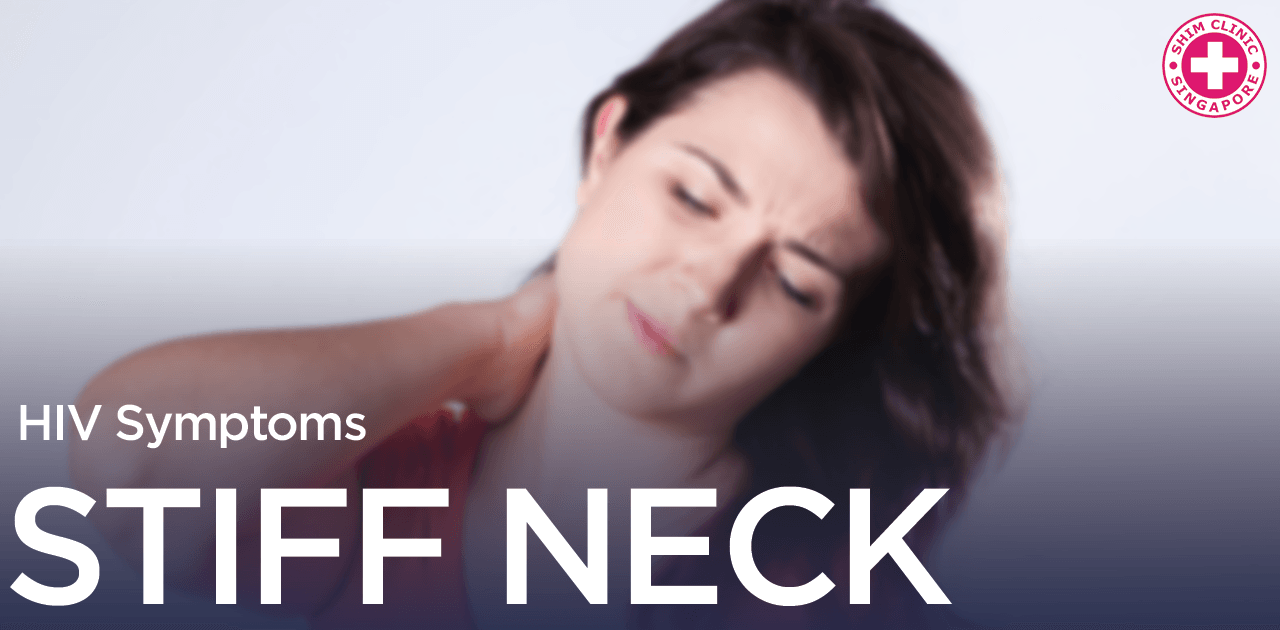HIV Stiff Neck Singapore | Shim Clinic
| Help me about HIV Stiff Neck ! |

| Permalink: https://shimclinic.sg/hiv-stiff-neck |
When first infected with HIV, some people experience a flu-like illness called acute HIV infection. Symptoms include stiff neck and muscle and joint pain, along with other symptoms. To find out whether the symptoms are due to HIV, an HIV test is used. A positive test is confirmed with a second test.
When first infected with HIV, some people experience a flu-like illness. This is called acute HIV infection. Not everyone has symptoms during this phase, but many people do, although they may not realize that their illness is actually due to HIV. After this illness passes, the virus will enter a latency phase and will not cause any more symptoms for years, although it can still be passed on to others during this time. It’s important to catch an HIV infection early, because it’s easier to keep the virus under control than it is to get it back under control after it causes severe symptoms. Also, it’s important to know that you have it so that you can protect your sexual partners.
One of the common symptoms that can occur during acute HIV infection is a stiff neck. This, along with other types of muscle and joint pain, is a result of the inflammation in the body while it’s attempting to fight off an invader. The neck stiffness may be relieved by taking anti-inflammatory medications (such as ibuprofen, which can be obtained in a pharmacy without a prescription), but it will continue to return. The stiff neck will linger for up to a few weeks before disappearing along with any other symptoms of acute HIV infection.
- When first infected with HIV, some people experience a flu-like illness called acute HIV infection. Not everyone has symptoms during this phase.
- If symptoms are present, they may include stiff neck.
- There are other causes of stiff neck. Injuries or postural causes will usually affect only the neck, while other infections will also affect other parts of the body.
- The symptoms disappear in a few weeks, but the virus remains in the body and can be passed to others. Later, it will cause severe symptoms.
- To find out whether your symptoms are due to HIV, you need an HIV test. If the first test is positive, then you’ll need a second test to confirm the results.
Neck stiffness also has many other causes. For example, other infections can cause it; some are very serious, such as meningitis, while others are not, such as influenza (the flu). A stiff neck can also be caused by an injury, such as whiplash, or may have a postural cause, such as sleeping in an unusual position or leaning the head forward to look at a screen. In this case, it’s usually only the neck that feels stiff and sore. However, when neck stiffness goes along with sore and stiff muscles and joints in other parts of the body, it becomes more likely that these are HIV symptoms or symptoms of another generalized infection.
The only way to diagnose HIV is with an HIV test. Even if you had an obvious exposure to the virus and you have several different HIV symptoms, you still need an HIV test to know for sure whether or not you have HIV. If you get a positive result, then you’ll need to have a second HIV test to confirm the results. This is because the tests sometimes do produce false positives, and it’s important to be certain of the diagnosis. If you have HIV, knowing about it early will give you the best chance to keep the virus controlled and live a relatively normal life.
Sources:
Mayo Clinic. “STD symptoms: Common STDs and their symptoms.” Mayo Clinic. Published 18 Mar 2015. Accessed 20 Jul 2016. http://www.mayoclinic.org/std-symptoms/art-20047081
Centers for Disease Control and Prevention. “Screening Recommendations Referenced in Treatment Guidelines and Original Recommendation Sources.” Centers for Disease Control and Prevention. Published 04 Jun 2015. Accessed 20 Jul 2016. http://www.cdc.gov/std/tg2015/screening-recommendations.htm
Centers for Disease Control and Prevention. “HIV/AIDS.” Centers for Disease Control and Prevention. Published 05 Jul 2016. Accessed 27 Jul 2016. http://www.cdc.gov/hiv/
Centers for Disease Control and Prevention. “HIV Basics – Testing.” Centers for Disease Control and Prevention. Published 12 Jul 2016. Accessed 20 Jul 2016. http://www.cdc.gov/hiv/basics/testing.html
U.S. Department of Health & Human Services. “Post-Exposure Prophylaxis (PEP).” AIDS.gov. Published 21 Sep 2015. Accessed 20 Jul 2016. https://www.aids.gov/hiv-aids-basics/prevention/reduce-your-risk/post-exposure-prophylaxis/
| Timeline | HIV | STD | Pregnancy |
|---|---|---|---|
| Before exposure | |||
| Contraception (females only) | |||
| HIV PrEP (pre-exposure prophylaxis) - Stop HIV infection before exposure | STD vaccine: - Hepatitis vaccine - HPV vaccine | ||
| STD / HIV exposure | |||
| 0-72 hours | HIV PEP (post-exposure prophylaxis) - Stop HIV infection after exposure | STD testing * - Screening test - to look for asymptomatic infections - from previous exposures | Emergency contraception with the morning-after pill (females only) |
| 2 weeks | HIV DNA Test | ||
| 1 month | HIV 4th Generation Test - SD Bioline HIV Ag/Ab Combo - Fingerprick blood sampling. - 20 minutes to results | ||
| 3 months | HIV 3rd Generation Test - OraQuick® HIV-1/2 Antibody - Oral fluid or - Fingerprick blood sampling. - 20 minutes to results | STD testing * - Full & comprehensive - diagnostic test - to look for current infections | |
| Watch for | HIV Symptoms | STD Symptoms | |
| If infected | HIV Treatment | STD Treatment | Abortion |
References